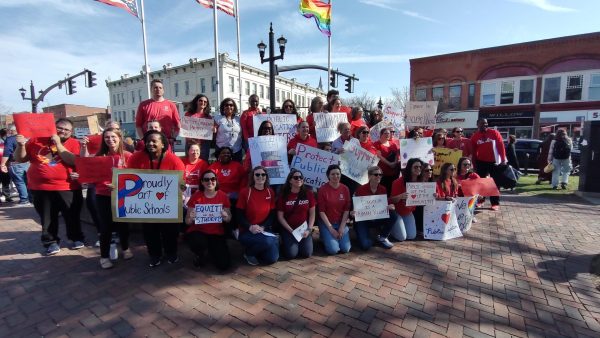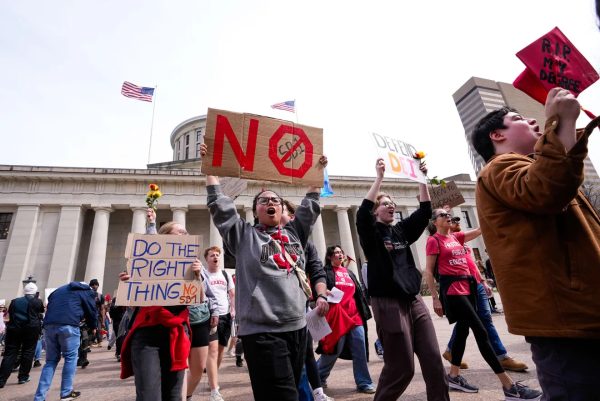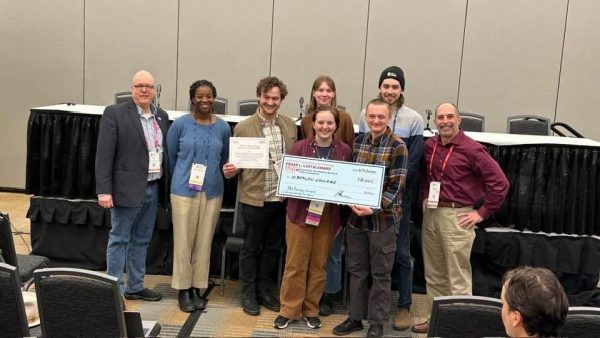Local Congressional Candidates Respond to Primary Delay
Editor’s note: Voters wishing to request an absentee ballot, including students at home, can find instructions for how to do so by following this link: www.ohiosos.gov/elections/voters/absentee-voting/. Voters can view their current registration address by following this link: lookup.boe.ohio.gov/vtrapp/lorain/vtrlookup.aspx#.
Ohio Governor Mike DeWine announced late Monday night that Ohio would delay its primary election, which was originally scheduled for Tuesday, to ensure the safety and wellbeing of voters as the novel coronavirus, or COVID-19, pandemic continues to spread across the state. After recommending the same action earlier Monday afternoon and being turned away by a Franklin County judge, DeWine directed Ohio Department of Health Director Amy Acton to close all polling locations, citing public health concerns.
DeWine recommended lengthening the period during which voters can mail in absentee ballots and concluding the primary by June 2 in order to transition away from in-person voting. Ultimately, the state legislature has final authority over that decision and a new primary date has not been finalized. The Ohio Democratic Party filed a lawsuit Tuesday afternoon, citing concerns that only votes counted prior to Tuesday would be counted.
The announcement, which created waves of confusion across the state, comes after Acton announced last week her office’s estimate that more than 100,000 Ohio residents were already infected with COVID-19, despite only a small fraction of that number having been confirmed by testing.
The candidates competing for the Democratic nomination in Ohio’s 4th congressional district, which includes Oberlin, had already adjusted their campaign strategies in response to the outbreak. All three recently announced that they would cease door-to-door campaigning.
“We shut our campaign down about a week ago, to limit the contact with the public for public safety,” said Jeff Sites, one of the Democratic congressional candidates. “Now it turns to, how do we communicate our differences from the other candidates across social media, across email — things like that.”
Despite the precautions they had already taken, Sites and his fellow candidates, Shannon Freshour and Mike Larsen, were surprised by DeWine’s decision given that, through the weekend, DeWine and Secretary of State Frank LaRose had maintained that the primary could proceed safely as planned. Incumbent Republican Jim Jordan is not running a contested primary and was not reached for comment.
Freshour emphasized that she understands the public health concerns, but that she believes the decision should have been made earlier.
“As a candidate, I understand the public health crisis, but the fact that this was done without any forethought, without any planning, is unconscionable,” Freshour said. “As a voter, I’m angry. People were disenfranchised today. … There were people who showed up [to] the polls today because they believed that they were supposed to vote.”
While Larsen and Sites were more on board with the decision, they both expressed concerns as well. Similarly to Freshour, Sites felt that the last-minute decision did not leave adequate time to communicate to voters. Larsen worries that the proposed new primary date, June 2, is too far away — especially given the likely transition to voting by mail.
“My biggest concern is why they chose a date so far off,” Larsen said. “It seems like we could do this with a much shorter suspension that just gives people time to vote by mail. The deadline to request a vote-by-mail ballot before all this happened was just this last Saturday. So clearly it doesn’t take that long to process those requests.”
It was uncertain until late Monday night whether Ohio voters should plan to head to the polls Tuesday or prepare to submit an absentee ballot request. Around 3 p.m. Monday afternoon, DeWine tweeted that he was recommending the state postpone in-person voting until June 2, and that his administration would file a lawsuit in Franklin County in order to do so.
DeWine further noted guidelines from the Centers for Disease Control and Prevention, which were updated Sunday to say that events taking place in the next two months with 50 or more people should be rescheduled.
Later that night, Franklin County judge Richard Frye issued a ruling denying DeWine’s proposal, saying that the recommendation to postpone came too late and would create a concerning precedent for future governors to unilaterally delay elections. Ohio election dates are legally decided by the state legislature.
Finally, shortly before midnight, DeWine directed Acton to effectively override the court order and shut down all polling locations.
“During this time when we face an unprecedented public health crisis, to conduct an election tomorrow would force poll workers and voters to place themselves at a unacceptable health risk of contracting coronavirus,” DeWine said in a statement. “As such, Health Director Dr. Amy Acton will order the polls closed as a health emergency. While the polls will be closed tomorrow, Secretary of State Frank LaRose will seek a remedy through the courts to extend voting options so that every voter who wants to vote will be granted that opportunity.”
Freshour’s anger at the postponement rollout was largely directed at LaRose, the member of DeWine’s administration with the most direct oversight of election protocol.
“Really the person who I think is most at fault in this is Secretary of State Frank LaRose,” Freshour said, citing disregard for the Franklin County court order and previous statements from LaRose’s office maintaining that the primary would be able to proceed as planned. “He should be fired or should be forced to resign. He has done a grossly incompetent job and has been desperately trying to destroy the election process since he took office last January.”
Prior to the election postponement, Freshour felt that DeWine had done a “solid job” in handling the COVID-19 outbreak in Ohio. Sites and Larsen also both voiced support for the governor.
“I am no fan of Mike DeWine in normal circumstances, but I think he’s being forceful and confident and not afraid to change course,” Larsen said. “I’ve been very impressed with the whole Ohio state government reaction to all this. It’s certainly not an easy time and nobody wants to be dealing with an epidemic, but I think they’ve been more than competent.”
It currently remains unclear whether the primary will be rescheduled for June 2, as DeWine recommends, or if the state legislature will choose another date. It is also unclear if in-person voting will resume at any point before the new deadline for voting to conclude, or if all future voting will be conducted by mail.
The Ohio Democratic Party filed a lawsuit Tuesday afternoon over concerns about how the decision to postpone will unfold. According to ODP Chair David Pepper, state Democrats want to ensure that the primary does continue, and support finding a date earlier than DeWine’s June 2 recommendation.
“Earlier today we said that we would litigate to defend voters’ right to fully participate in the state’s Democratic primary election, and in the absence of action by the General Assembly and with other actors moving to shut down the primary, we have filed with the Ohio Supreme Court to ensure that all eligible Ohio voters are able to exercise their right to vote in this primary,” Pepper wrote in a statement released Tuesday.
Freshour agreed that the logistical uncertainty is a cause for concern.
“I voted on February 19 — that’s a month ago,” Freshour said. “We have no idea what’s going to happen to those ballots. If we go to June 2, that’s almost four months that ballots will be somewhere and nobody knows where they are [or] if they’re going to be secure. Who’s going to control them? … What happens if there’s a flood? What happens if there’s a fire? There’s no … plan in place for how to deal with this concern.”
Three other states moved ahead with elections on Tuesday: Arizona, Florida, and Illinois. All three faced challenges related to COVID-19; turnout was low as some voters reported staying home due to health concerns, and some voting locations were abruptly closed, particularly in Florida, as poll workers declined to report for work. Illinois ultimately decided to extend its voting hours after facing low turnout earlier in the day.
In Oberlin, news of the delayed primary came after most students living in College-owned housing were asked to vacate campus over COVID-19 concerns and return home by Monday at noon, prompting worries that many students who had planned to vote on Election Day would ultimately be unable to do so.
Larsen said that he hopes the unexpected nature of the postponement and its impact on voters, including students, will push the state to consider moving to an exclusively vote-by-mail system for future elections.
“This is another good reason why we should be moving away from in-person voting and moving to mail voting, and someday I hope that online is perfected to a point where we can trust it,” Larsen said. “There’s no reason to have any in-person voting. It seems to just be because people like it, and I get it — I like it too.”
All three Democratic candidates were united in their opposition to Jordan’s response to the outbreak. Over the weekend, Jordan was one of just 40 congresspeople, all Republicans, to vote against a coronavirus relief package that ultimately passed through the House of Representatives 363–40.
“It goes along the lines of what Jim Jordan has always done,” Sites said. “He’s never voted for the people of the district. He’s voted for his self-interest, and he wanted to play kowtow to Donald Trump and what he wanted to do for this virus outbreak.”
Currently, there are six confirmed cases of COVID-19 in Lorain County, including one College employee from Campus Dining Services, according to Lorain County Public Health. However, according to health officials, the number of confirmed cases does not reflect the number of actual cases, and residents should continue to exercise caution and employ social distancing practices. Local updates about the outbreak can be found at www.loraincountyhealth.com, and national alerts can be found at www.cdc.gov.






